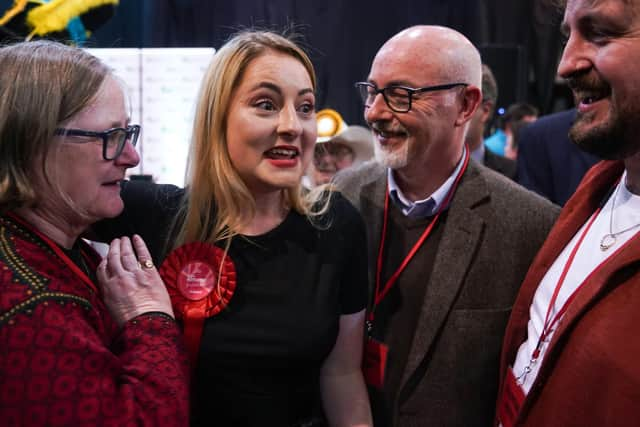Scots will choose whether to be part of Labour change - or back a SNP set on undermining it - Brian Wilson
Correctives to complacency can be turned into assets and events of the past week should have that effect on anyone in Labour ranks who thinks the General Election is a done deal.
Just when it all seems to be going so well, a sucker punch appears from around the corner. Harold Macmillan is credited with the line “events, dear boy” as the most potent form of opposition, though he probably never said it.
Advertisement
Hide AdAdvertisement
Hide AdThe spectacular by-election results from yesterday morning will have steadied the nerves. If repeated throughout the country, they would leave the Tories with four seats. So the one thing we can be certain of is that they will not be repeated throughout the country.


When the chips are down in a General Election, the Tory Party is a resilient beast. The collective mood which these by-election results reflect is at least as strong as it was in the approach to 1997. It is clearly Labour’s election to lose but that has happened before, so take care…
The main reminder that nothing can be taken for granted cropped up in Rochdale with the Labour candidate saying stupid things about terrible events in Israel and Gaza. One was defensible; two got him the red card, without going to VAR.
It is a scenario that leaves Labour without a candidate in the by-election which will be an embarrassment for the next fortnight. Yet how it has been dealt with can turn out to be more significant than the original offence.
Most voters have a more nuanced approach to these matters than political nerds would like to think. They are capable of separating individual error from general malaise. The vast majority accept that Labour under Starmer is very far from being a hot-bed of extremism, no matter what the Daily Mail tells them. His job is to keep it that way.
That involves a careful course of navigation on every issue which arises, both domestic and international. There is a big difference between being a party of opposition and a government-in-waiting.
The former can say anything without lasting cost; the latter must expect every word and deed to be scrutinised.
Positions on the horrific events in Gaza represent an immediate example. Everyone wants to see violence ended which can, as in any war, only happen if both sides lay down their arms. That will only be achieved through diplomacy behind closed doors rather than in any public forum.
Advertisement
Hide AdAdvertisement
Hide AdPoliticians who hope and expect to be in positions of real influence within months have the duty to act accordingly. The test is not if they can win applause now by taking a particular line but whether that enhances or detracts from their potential future role.
Holding the line that peace will only come through diplomacy may be difficult but in the longer term will prove to have been essential. Most voters who abhor both the murderous Hamas attacks on innocent people and the brutal Israeli response recognise the complexities that serious politicians and peacemakers face.
The other hook that Labour had to get itself off in recent days was the daft commitment to borrow £28 billion a year to fund the energy transition. Again, difficulty can be turned to advantage by reaffirming the lesson that putting numbers on policies while in a position to do nothing about them is for the political birds.
I can’t imagine what reasoning went into the precision of the figure in some obscure committee room. Why 28 and not 48? Or indeed eight? The only people interested in a specific number were Labour’s enemies who in due course, were bound to ask the question: “Where’s the money coming from?”.
It is an object lesson in why it is commitment to a policy and direction of travel that matter, far more than a number. Spending £28 billion a year effectively would be as big a challenge as finding the money in the first place. However, there are a thousand things that can and should be done by government to drive the transition, many of which do not depend upon huge levels of spending.
For example, Labour should come into government with a clear view of how the regulatory and planning regimes are going to change in order to facilitate development of renewable energy projects and infrastructure. They should have an acute awareness of the need to maintain and create employment in existing energy industries while the new ones are developing.
Of course there will need to be investment to support transition on the scale envisaged. The creation of GB Energy as a major player based in Scotland is an excellent policy. Now it is far more important to have the aims and strategy clear than adhering to a fanciful number which only served as a target for opponents to aim at.
Getting off that hook was necessary. Reaffirming objectives and working on the detail are what matters.
Advertisement
Hide AdAdvertisement
Hide AdIn Scotland, polls tell slightly different stories. All agree that Labour will gain seats but numbers vary dependent on a few percentage points. I think that is the reality. The SNP core vote will not melt away because it is tied to a fundamentalist belief.
However, everyone who is not mainly concerned with the constitution will, as an election approaches, make a choice between Scotland being a big part of an incoming Labour government and the change it brings, or else be represented by people whose interest is in undermining it with a Scottish accent from day one.
Every time the SNP’s Westminster leader opens his mouth, with rancorous hostility towards Labour, the clarity of that choice becomes more apparent. These by-elections confirm that Labour remain on course and, however much the SNP loathes it, that is a prospect most Scots will welcome.